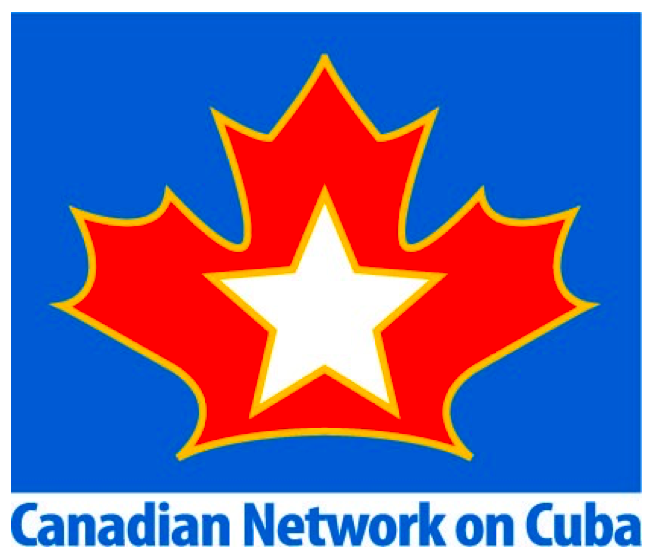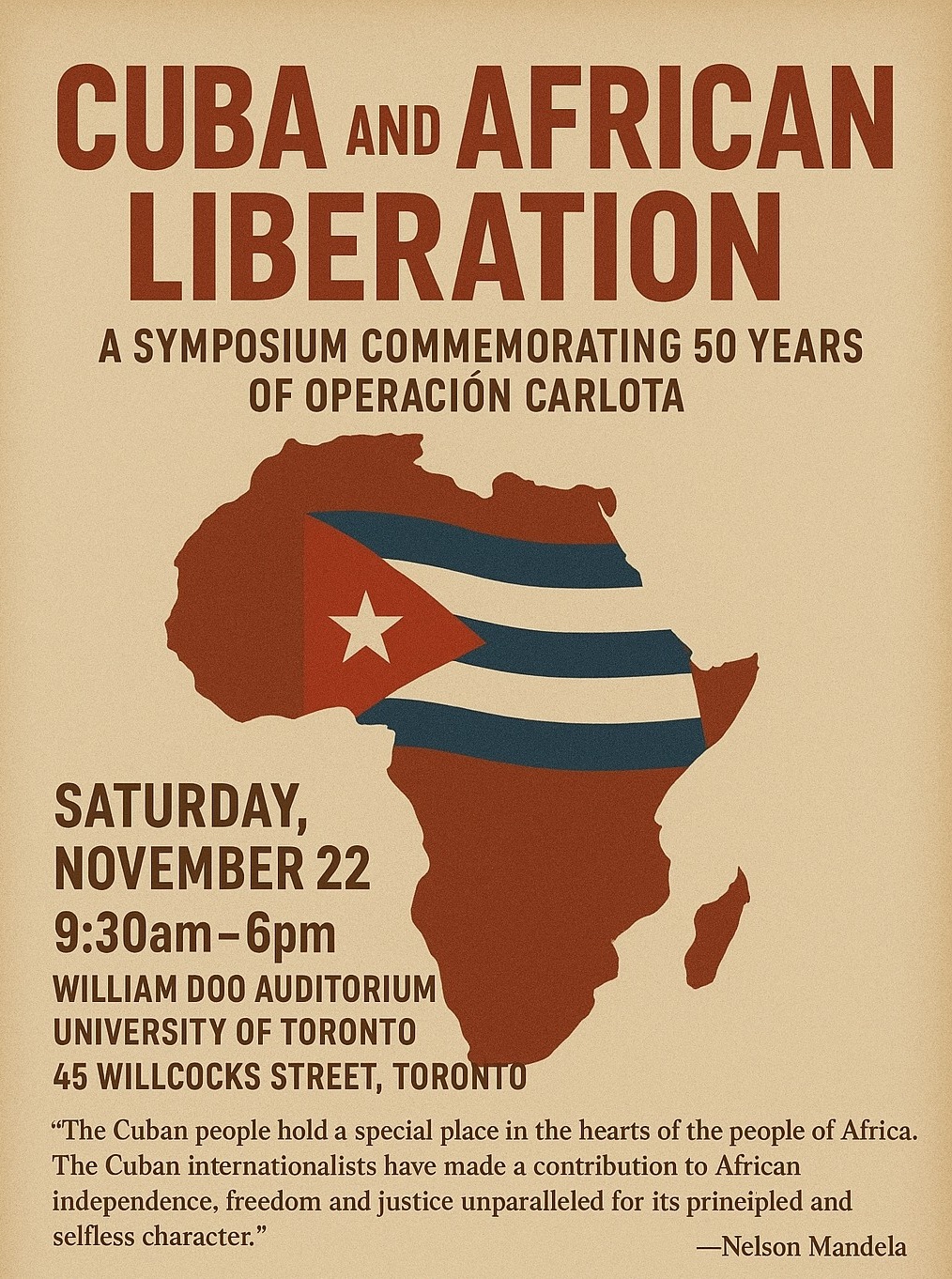CUBA AND AFRICAN LIBERATION
A Symposium Commemorating 50 Years of Operación Carlota
Saturday, November 22
9:30am – 6:00pm
William Doo Auditorium
University of Toronto
45 Willcocks Street, Toronto
For more information email: cubaafricanliberation@gmail.com
“The Cuban people hold a special place in the hearts of the people of Africa. The Cuban internationalists have made a contribution to African independence, freedom and justice unparalleled for its principled and selfless character.”
– Nelson Mandela –
2025 marks the 50th anniversary of Operación Carlota, Cuba’s internationalist mission in southern Africa, which was pivotal in securing Angola and Namibia’s independence and hastening the fall of apartheid South Africa. The 50th anniversary of Operación Carlota marks a milestone in the global struggle against] colonialism, apartheid, and imperialism. The successful military defense of Angola by Cuban and Angolan forces hastened the independence of Namibia in 1990 and dealt a severe blow to the apartheid regime in South Africa, hastening its demise.
CUBA AND AFRICAN LIBERATION- A Symposium Commemorating 50 Years of Operación Carlota brings together scholars, veterans, activists, artists, and students to reflect on the historic significance and enduring relevance of Cuba’s solidarity with the African liberation struggle—particularly= through Operación Carlota. The event explores themes of principled internationalism, anti-imperialist solidarity, and collective liberation. As contemporary forms of neocolonialism and imperialism continue to threaten African sovereignty, the legacy of Operación Carlota offers urgent lessons for today’s global struggles. The symposium is organized & sponsored by: Black & African Diaspora Studies-Dalhousie University; Centre for Caribbean Studies-University of Toronto; Canadian Network On Cuba; Global African Congress; National Network On Cuba (U.S).
On November 5, 1975, in response to a direct and urgent appeal from the newly independent government of Angola, Cuba launched Operación Carlota. This bold act of internationalist solidarity was in direct response to a military invasion by apartheid South Africa, which, backed by the United States and other Western powers, sought to crush Angola’s fledgling Black led government and halt the broader tide of African liberation.Angola had only just emerged from a protracted and brutal anti-colonial war against Portuguese colonialism. Its independence, won through great sacrifice, was immediately threatened by a foreign-backed effort to impose a client regime and derail genuine sovereignty.
In this context, Operación Carlota—named after Carlota Lucumí, an enslaved African woman who led a revolt in Cuba on November 5, 1843—was a decisive intervention. Cuban forces, in coordination with Angolan troops, halted the South African advance toward Luanda and drove the invading forces out of Angola. This victory marked a turning point in the African anti colonial and anti-apartheid struggles. The defeat of the apartheid army on the battlefield shattered the myth of white invincibility and emboldened liberation movements across the continent.The significance of Cuba’s action was not lost on the African continent. The World, a Black South African newspaper, captured the moment:
“Black Africa is riding the crest of a wave generated by the Cuban success in Angola. Black Africa is tasting the heady wine of the possibility of realizing the dream of ‘total liberation.”
Operación Carlota would last more than 15 years. More than 400,000 Cuban soldiers, teachers, doctors, engineers, and workers served in Angola in various capacities during the mission. More than 2,000 Cubans lost their lives defending Angola’s sovereignty and supporting the right of the peoples of southern Africa to self-determination and freedom. This long struggle culminated in 1987–88 at Cuito Cuanavale, where combined Cuban and Angolan forces dealt a decisive defeat to the apartheid South African military. Yet Cuba’s extensive and crucial role in the struggle against apartheid, and the broader regional war of terror waged by the apartheid regime that set the context for Cuba’s intervention, remain virtually unknown in the West. This extraordinary example
of anti-imperialist solidarity remains largely erased from mainstream historical memory.
Equally forgotten is the apartheid state’s regional war of terror waged in Namibia, Angola, Mozambique, and beyond—which made Cuba’s intervention not only necessary, but historic. The struggle for and against apartheid unfolded both inside and beyond South Africa’s borders. Determined to secure and entrench its regional dominance, the apartheid regime waged war across southern Africa. Indeed, far more people—tens, if not hundreds, of thousands—lost their lives outside South Africa than within it.
As the Truth and Reconciliation Commission observed, “the number of people killed inside the borders of the country in the course of the liberation struggle was considerably lower than those who died outside.” The human toll was staggering: between 1981 and 1988 alone, an estimated 1.5 million people were killed directly or indirectly, among them 825,000 children.
Today, thousands of Cuban medical personnel provide essential services across dozens of African countries. In 2014, Cuba made a decisive contribution to the fight against the Ebola epidemic in Guinea, Liberia, and Sierra Leone, sending the largest medical mission of any country. ”More than 450 Cuban doctors and nurses—selected from over 15,000 volunteers—traveled to West Africa to stand alongside its peoples in the struggle against Ebola. As Cuba’s ambassador to Liberia, Jorge Lefebre Nicolas, affirmed:
“We cannot see our brothers from Africa in difficult times and remain there with our arms folded.”
At the September 16, 2014, United Nations Security Council meeting, Cuban representative Abelardo Moreno underscored:
“Humanity has a debt to African people. We cannot let them down.”
Even the Wall Street Journal acknowledged:
“Few have heeded the call, but one country has responded in strength: Cuba.”
Nevertheless, as Cuba specialist John Kirk notes, Cuba’s medical internationalism remains one of “the world’s best-kept secrets.
Commemorating the anniversary of Operación Carlota is not simply an act of historical recovery. Fifty years on, Operación Carlota reminds us that the fight for African independence remains as urgent as ever. In a time when the struggle for authentic African independence and sovereignty is again under threat—from neocolonial economic domination, foreign military interventions, and resource plunder—it serves as a reminder of the possibilities of principled internationalism, solidarity, and collective liberation.
For more information email: cubaafricanliberation@gmail.com


Leave a Reply